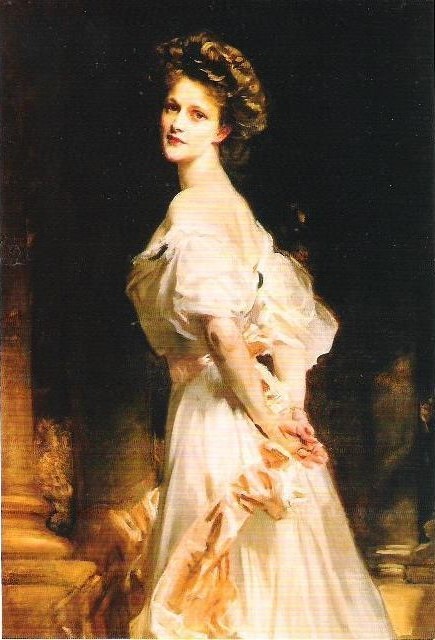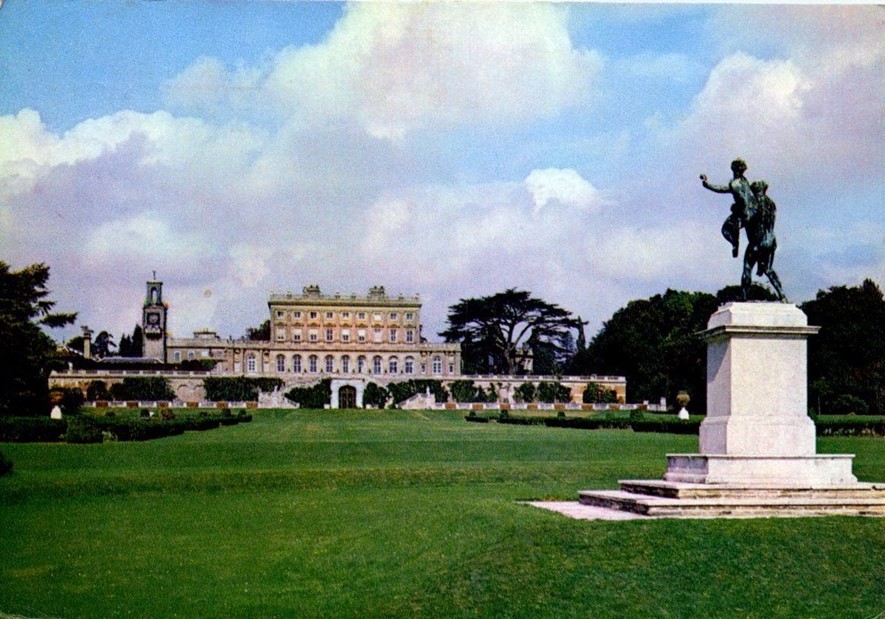Bill Burton
Lady Astor and the D-Day Dodgers
Nancy Witcher Langhorne was born in 1879 into a family that had a substantial Virginia plantation that was lost in the Civil War. Her father, Chiswell Langhorne, a colonel in the Confederate army, was mustered out in 1861 and could not recover either his family’s plantation or its slaves as abolition had taken effect.

Nancy Astor, painted by
John Singer Sargent, 1908
For several years Chiswell struggled to find his footing. Eventually he entered the Virginia loose-leaf tobacco auction business and through connections with friends he’d made in the military was able to land a construction contract with the Chesapeake and Ohio Railway.
This entry into the railroad business was the basis for Chiswell’s new fortune and by 1885 he had moved his wife and family into a substantial property near Richmond, Virginia, and later to Charlottesville, Virginia.
Nancy and her three sisters attended finishing school in New York City and it was there that she met Robert Gould Shaw II. They married in 1897, when she was 18.
Alas, the marriage was not a happy one and six years later they divorced. She and her son Robert Gould Shaw III moved back to the family’s Virginia home to take over the management of her widowed father’s household. That too proved unsuccessful.
In 1905, encouraged by her father, Nancy and a sister embarked on a tour of England. Nancy fell in love with the country and decided to stay.
The Langhorne sisters have been described as vivacious, beautiful, and strong-willed. Nancy’s American roots were not a problem for her to fit into a society where numerous American women were marrying English aristocrats. She had met Waldorf Astor on her voyage to England and they were married in 1906.
Waldorf’s father William was active in politics and newspaper publishing. As a wedding present he gifted the couple the family’s Cliveden estate, which is about 30 miles west of London. It was there as well as Cliveden House in London that Nancy Astor established herself firmly as a member of English society as well as its politics.

The Cliveden Estate
William Astor was elevated to a hereditary peerage in the House of Lords in 1916. His death in 1919 meant that his son Waldorf, who had gone into politics in 1910 and won a seat in the House of Commons, became the Second Viscount Astor and consequently had to give up his Parliamentary seat.

Nancy ran in a by-election and won, but she was not the first woman elected to Parliament. Constance Markievicz had won a seat in the general election of 1918, but as an Irish Republican, chose not to take her seat. It is notable that Nancy Astor, who had no background in suffragist activity, succeeded despite that weakness. Some said she won because of the “halo effect” of her husband. In fact, nearly one-third of the women elected to the House of Commons between the wars succeeded their husbands.
Her years in the Commons were notable as much for what she did not do (advance legislation) as for what she did do (actively advocate for a variety of issues). She was a vigorous opponent of alcohol and worked to raise the drinking age in pubs from 14 to 18. She supported adding women to positions in the civil service and caring for child victims of crime. She became the first president of the Electrical Association for Women in 1924 and in 1925 chaired the first International Conference of Women in Science, Industry, and Commerce.
She also became known for her sharp, sometimes vicious, tongue. When a political foe died, she expressed her pleasure, remarking that “I’m a Virginian, we shoot to kill.” She said that the reason why England’s national cricket team lost to the Australian team was that the English used too much alcohol.
In 1926 she, her son, and a young friend visited the Soviet Union, in part because of a challenge about whether British workers had it better than Russians. The British press reported that the young friend declared for the Russians and that her son made flattering comments about Communism. Press accounts of Astor’s sharp questioning of Stalin’s slaughtering of Russians were reported as less than challenging to the Soviet dictator.
In the 1930s Astor’s social life at Cliveden showed ambivalence about Nazism, communism, anti-Semitism, and anti-Catholicism. Attendees at her parties at Cliveden were referred to as the “Cliveden Set” and in 1936 she welcomed Hitler’s Foreign Minister Joachim von Ribbentrop. Her guests also included anti-communists, quiet anti-Semites, and men like Joseph P. Kennedy, Charles Lindbergh, and Neville Chamberlain who openly opposed going to war with Hitler. She abhorred Hitler’s anti-Jewish policies while pleased that he was a bulwark against communist Russia. As a convert to Christian Science, she was appalled at Hitler’s treatment of her co-religionists.
In 1939, when Britain went to war with Hitler, Astor began to modify her views. One MP was having none of it, calling her “the Member for Berlin.” As she had during The Great War, Astor ran a hospital for Canadian soldiers. A rumor had it that she openly preferred the soldiers of the first war.
Through it all, she traded barbs with Winston Churchill. Two of the better-known are when Churchill wondered aloud what he should wear to a masquerade ball she was holding at Cliveden. “Why don’t you come sober, Prime Minister?” And after failing to shake Churchill’s position in debate, she confronted him. “If you were my husband, I’d put poison in your tea.” “Madam,” Winston is said to have responded, “if I were your husband, I’d drink it with pleasure.”
But it was a remark that Astor supposedly made in a speech that lit a firestorm in the ranks of British soldiers. It was one she always denied but one which was widely believed by the soldiers and fitted her public persona. The story was that Lady Astor referred to the men who were fighting in the Italian campaign as “D-Day Dodgers.” The soldiers were incensed, believing that she was suggesting they were avoiding the 1944 invasion and the “real war” in France.
The response came in the form of a song set to the tune of “Lili Marleen,” a German tune adopted by Allied soldiers in the North African campaign as their own. The authorship is not certain and various verses have been changed over time, but the “Ballad of the D-Day Dodgers” was a bitingly sarcastic response to the insult. These are the last two verses of the song:
Now Lady Astor, get a load of this.
Don’t stand up on a platform and talk a load of piss.
You’re the nation’s sweetheart, the nation’s pride
We think your mouth’s too bloody wide.
We are the D-Day Dodgers, in Sunny Italy.
When you look ’round the mountains, through the mud and rain
You’ll find the crosses, some which bear no name.
Heartbreak, and toil and suffering gone
The boys beneath them slumber on
They were the D-Day Dodgers, who’ll stay in Italy.
In the general election that followed the 1945 European victory, when the Labor Party swept the Tories and Churchill from office, Lady Astor did not stand for re-election. She was bitter about what she viewed as a plot to keep her out of office and about the changes in British society. After her husband died in 1952, she became increasingly isolated from her family. She died in 1964.


Glad to get this history of Lady Astor.
I was familiar with the “I’d drink it” exchange with Churchill, but Lady Astor’s anti-alcohol stance and the “D-Day Dodgers” controversy were among the things to which this article introduced me.
Fascinating article!